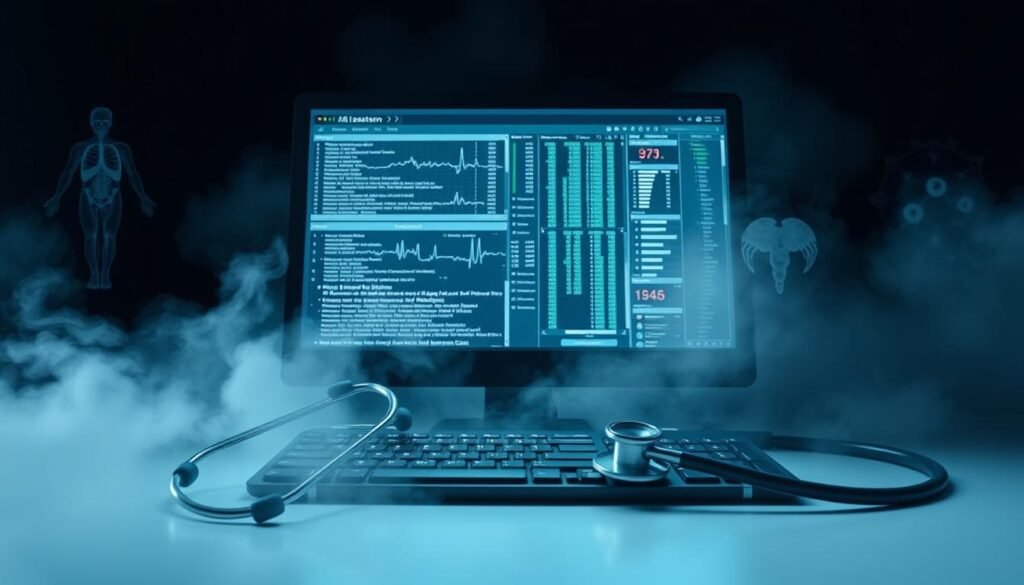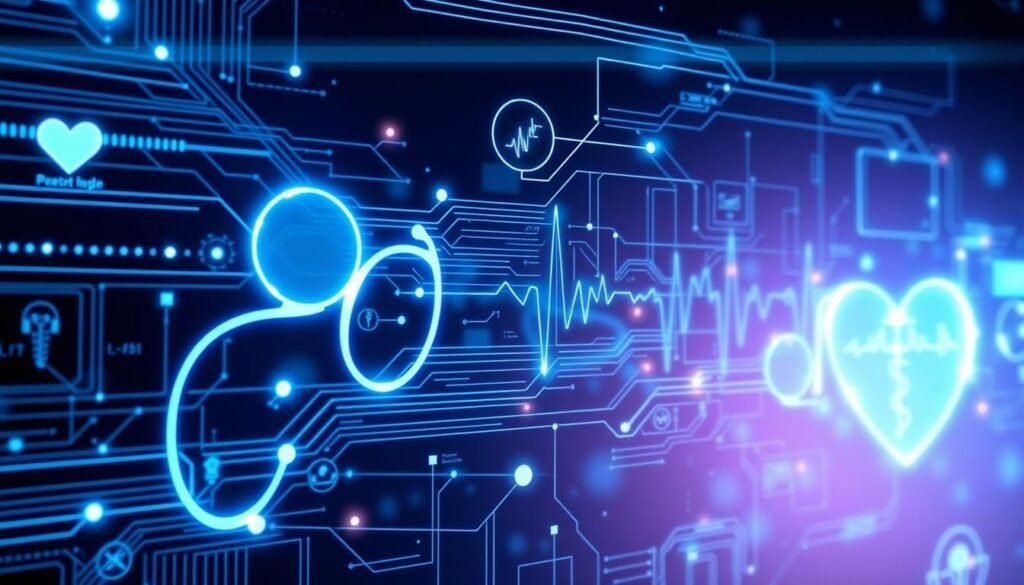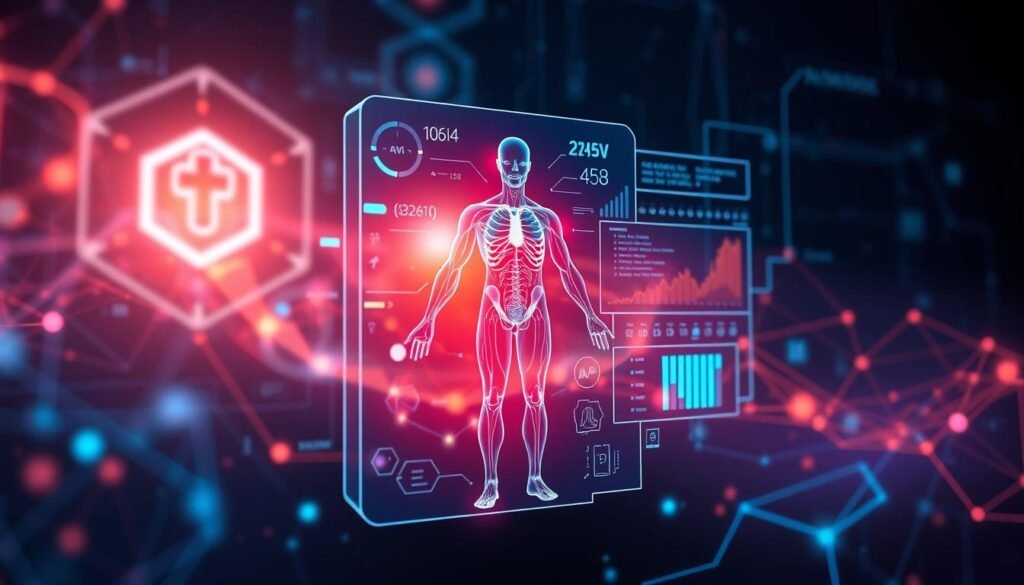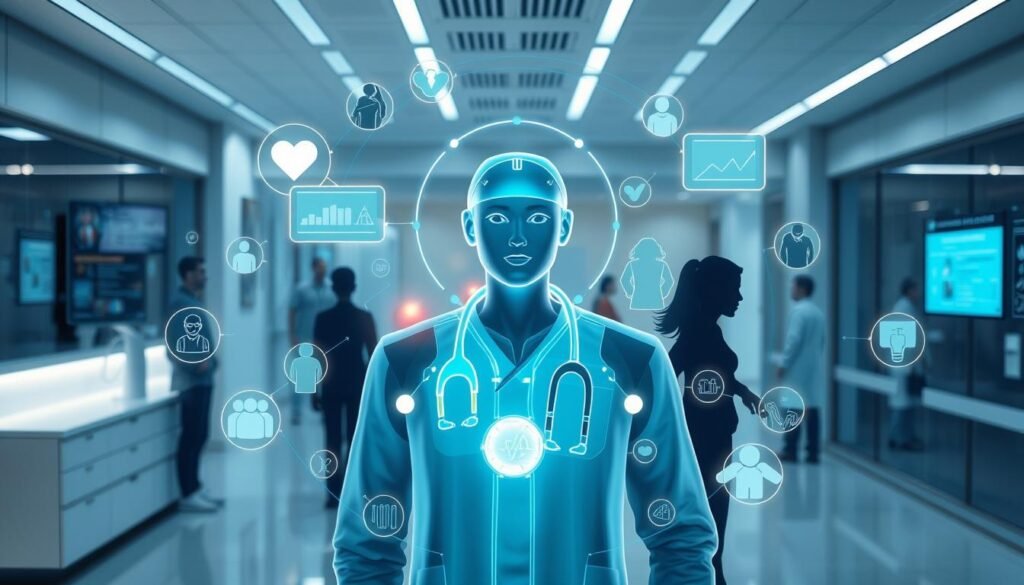ChatGPT recently passed the U.S. Medical Licensing Exam, which has raised concerns among healthcare professionals1. While it shows some medical knowledge, experts warn against using it for real-world diagnosis and advice1. The risks of using ChatGPT for medical purposes are high, as it can give false information or wrong diagnoses, which could be deadly.
It’s vital to get professional medical advice from healthcare providers, not just AI services1. ChatGPT and similar AI tools may not fully grasp the complexities of human health or personalized care2. Knowing what ChatGPT can and can’t do helps you use it wisely in healthcare.
Key Takeaways
- ChatGPT has shown some medical knowledge but should not be relied upon for definitive medical diagnosis or advice.
- Experts caution against using ChatGPT as a substitute for professional medical care, as it can provide false information or lead to incorrect diagnoses.
- The importance of seeking guidance from healthcare providers, instead of relying only on unregulated AI services, is emphasized.
- ChatGPT and similar AI tools have limitations in understanding the complexities of human health and personalized medical care.
- Responsible use of ChatGPT in healthcare requires understanding its capabilities and limitations.
Introduction: The Risks of Using ChatGPT for Medical Diagnosis
Experts warn against using ChatGPT for medical advice alone. It can give wrong information or lead to bad diagnoses3. ChatGPT might help in healthcare, like making radiology reports better and aiding in clinical decisions. But, there are big legal and ethical issues to consider3.
ChatGPT could give bad medical advice, leading to big legal problems. Who is to blame if something goes wrong—the patient, the hospital, or the tech company3?
For your health, it’s best to get advice from real doctors, not just AI4. Mental illness affects one in eight people globally4. Chatbots like ChatGPT are getting used more in healthcare, with over 10% of US doctors using them by June 20234. But, the American Medical Association warns doctors not to use ChatGPT because of lack of rules4.
AI tools might make healthcare better and faster, but we must know their limits5. Healthcare groups must take strong steps to keep data safe and protect privacy when using AI like ChatGPT3.
ChatGPT’s Limitations in Diagnosing Real-World Medical Cases
AI tools like ChatGPT are good at giving general health info. But, they struggle with complex medical cases6. A doctor’s test showed ChatGPT misses serious issues like ectopic pregnancy and brain tumors6.
ChatGPT 4.0 got 87.2% of USMLE Step 2 Clinical Knowledge (CK) questions right. This is a big jump from ChatGPT 3.5’s 47.7%6. But, it only got 74.6% of 63 case reports right6.
More research shows ChatGPT does well in most cases but fails with complex ones7. It got 95% of cases right but missed some details7.
These studies show ChatGPT and similar tools have limits in medical diagnosis67. AI is useful in healthcare but should not replace doctors’ advice. Always get medical advice from experts for your health.
The Dangers of Relying on ChatGPT for Medical Diagnoses
ChatGPT can miss serious conditions and give wrong diagnoses67. It’s important to know its limits. Use ChatGPT as a help, not a replacement for doctor’s advice.

“ChatGPT and other AI tools have the power to improve healthcare. But, they should never replace professional medical advice. Always get help from qualified healthcare providers for accurate diagnosis and treatment.”
The Role of AI in Enhancing Healthcare
AI, like ChatGPT8, can greatly improve healthcare. But, we must know its limits to avoid problems. ChatGPT can give helpful answers to many questions8. It can help doctors and scientists by quickly looking through lots of research8.
It can also help with managing medicines, finding patients for studies, and summarizing patient records8.
But, AI tools like ChatGPT also bring challenges9. They can help doctors make better decisions, but there are risks9. There’s a chance of biased data leading to unfair treatment or wrong advice9.
As AI becomes more common in healthcare, doctors and researchers need to work together9. They must make sure AI is used safely and ethically9.
Experts say we should be realistic about what AI can do now8. Tools like ChatGPT are useful, but doctors should always use their own judgment9. This way, AI can help improve care without risking patient safety9.
“The integration of AI in healthcare holds immense promise, but we must approach it with a clear understanding of the current capabilities and limitations of these technologies to ensure they are used responsibly and in the best interest of patients.”
Appropriate Use Cases for ChatGPT in Healthcare
ChatGPT can give general info on health, meds, and diseases. But, it’s not for making medical decisions or giving final diagnoses10. Experts say it’s good for info, but not for making medical choices. It doesn’t have the personal touch or medical know-how needed for accurate diagnoses10.
Enhancing Healthcare Processes
ChatGPT can help make healthcare better by making things easier and improving care11. Here are some ways it can help:
- It can make patient education materials, health blogs, and pamphlets to help patients understand better10.
- It can summarize treatment plans for conditions like Type 2 diabetes, helping in patient talks and medical records10.
- It can outline medical case studies, helping in medical education, writing, and presentations10.
- It can list drug interactions, making prescriptions safer and helping with patient advice and alerts10.
- It can write referral letters for specialist visits, improving care through teamwork10.
- It can come up with ideas for patient newsletters, pushing for preventive care and community health10.

ChatGPT has big benefits for healthcare, but we must know its limits and use it right12. Using it wisely means looking at legal, ethical, and privacy issues. This helps keep patients safe and healthcare services honest12.
chat gpt medical diagnosis prompt
Chat gpt medical diagnosis prompt and other healthcare ai tools can give general health tips. But, experts warn against using them for final medical advice or diagnoses. These AI tools often miss the detailed medical knowledge needed for accurate diagnoses and treatment plans13.
A study by Western University found ChatGPT was only 49% accurate in diagnosing 150 complex medical cases13. The chatbot had trouble understanding test results and missed important details for diagnosis13.
Dr. Amrit Kirpalani says AI literacy is key for everyone in healthcare13. It helps understand the limits of symptom analysis tools. Proper prompt engineering and supervision are also vital to avoid serious risks from relying on AI for medical decisions13.
| Statistic | Value |
|---|---|
| Americans who believe AI will surpass humans in diagnizing and treating medical conditions | Two in three14 |
| Americans willing to follow medical advice generated by AI | Four in 1014 |
| Relevance but low accuracy of medical advice provided by ChatGPT | High relevance, relatively low accuracy14 |
| Americans’ expectations of AI in healthcare | A supportive tool for doctors and providers, not a replacement for physicians14 |
Healthcare ai can improve medical diagnosis and treatment. But, we must know its limits and use it as a helper, not a replacement for doctors14. Always check with real healthcare providers and verify AI info with trusted sources14.

Recent studies show AI like GPT-4 can help with diagnostic reasoning tasks. GPT-4 can imitate common clinical reasoning processes without losing accuracy15. Using GPT-4 for diagnostic prompts shows promise in solving tough clinical cases15.
As healthcare ai grows, its role in medicine will become more critical. But, we must always remember its strengths and weaknesses. Patient safety and personalized care should always come first14.
“The responsible use of generative AI models in healthcare requires oversight and guidance on prompt engineering to ensure patient safety and avoid potentially life-threatening consequences.”
– Dr. Amrit Kirpalani13
The Importance of Patient Context and Personalized Care
Medical chatbots, diagnosis assistants, and AI-powered virtual triage systems can give basic health info. But they can’t give accurate medical advice because they don’t know the patient’s full story16. They don’t have access to a patient’s medical history, current meds, lifestyle, and other important details that doctors use to make a good diagnosis17.
Experts say it’s key to get care from doctors who know all about you. Medical NLP (Natural Language Processing) is great, but it can’t make the same smart choices as doctors16.
Using only AI for medical advice can lead to wrong conclusions and harm16. Patients should be careful with virtual health tools. Always check in with your doctor for care that really fits you.

“ChatGPT and other AI services do not consider personalized patient information, such as medical history and lifestyle factors, limiting their ability to provide accurate medical advice.”
Best Practices for Using AI in Healthcare
Experts suggest several best practices for using AI tools like chat gpt medical diagnosis prompt in healthcare18. It’s important to know the limits of these healthcare ai and medical chatbot systems. They can be great diagnosis assistant tools, but shouldn’t be the only source for medical advice or diagnoses18.
- Give as much relevant info as you can when using the tool, like symptoms, medical history, and lifestyle19.
- Check any advice or info from the AI tool against credible medical sources to ensure it’s right19.
- Always see a healthcare provider for personalized advice and care, as AI tools lack human context and expertise19.
As the healthcare industry uses more healthcare ai and medical chatbot tech, it’s key to use these tools wisely18. By following best practices and staying skeptical, healthcare pros and patients can use AI’s benefits while avoiding its risks.
“Prompt engineering is key in guiding AI models toward generating desired outputs effectively. Crafting specific prompts is essential for accurate and focused responses.”18
AI tools like chat gpt medical diagnosis prompt and diagnosis assistant can improve healthcare quality and efficiency20. But, it’s vital to know their limits20. Studies show these systems can struggle with complex, non-classic medical cases. This highlights the need for healthcare pros to keep a critical eye and seek personalized advice20.
Realistic Expectations for AI in Healthcare
As the healthcare ai and medical chatbot world grows, setting realistic expectations is key18. AI models like GPT-4, Microsoft CoPilot, and Gemini are powerful tools, but they have limits. They should not be the only source for medical info or advice18.
By following best practices and keeping a balanced view, healthcare pros and patients can use AI’s benefits safely192018.
Healthcare Chatbot Prompts: A Complete Guide
Artificial intelligence is changing healthcare fast. Chatbots are now key in the field21. They help 24/7, make scheduling easier, and even help with mental health21. This shows healthcare’s focus on caring for patients fully21. The use of NLP and ML in these chatbots shows the tech’s advanced role in healthcare21.
Healthcare pros need a guide to use these chatbots well. Over 100 ChatGPT prompts have been made for this22. These cover many healthcare areas like talking to patients and doing research22. They help chatbots give insights and advice to better healthcare and patient results.
Creating good prompts for chatbots is key. Clarity, context, and keeping things up to date are important22. Also, keeping patient info safe is a must22. This means using data safely and getting legal advice to follow privacy rules.
- Prompt engineering in healthcare uses AI like ChatGPT for many tasks22.
- Good prompts need to be clear, have context, and be updated regularly22.
- A checklist for prompts includes being specific, clear, and ethical22.
Tools like Comet’s LLMOps toolbox help make chatbots better23. They let you try different prompts and track how they’re used23. This helps improve how chatbots work and talk to patients23.
The healthcare industry is getting more into AI. Making good chatbot prompts is key to better healthcare21. With AI and healthcare expert help, chatbots will make healthcare better, more personal, and easier to get21.
“Crafting effective prompts is essential for obtaining accurate information in healthcare.”
Ethical and Privacy Considerations
AI chatbots like ChatGPT are becoming more common in healthcare. But, we need to think about the ethics and privacy issues they raise24. Experts warn against sharing personal health info with AI, as it might not be safe or follow HIPAA rules3.
Privacy in healthcare with ChatGPT is about keeping patient info safe. This includes medical histories, test results, and diagnoses. It’s important to keep this info private and follow privacy laws3.
There’s a risk of linking patient info with ChatGPT’s data. We need strong ways to keep data safe and control who can see it3. It’s also key to tell patients how their data will be used by ChatGPT3.
To keep patient data safe, we need good security. This includes encryption, access controls, and watching for any issues3. We also need to figure out who is responsible if something goes wrong with ChatGPT3.
As AI in healthcare grows, we must think about ethics and privacy24. We need to weigh the good of AI chatbots against keeping patient data safe. This is important for using these tools wisely in healthcare.
The Future of AI in Healthcare
As healthcare AI, symptom analysis, and medical NLP grow, they’ll play a big role in healthcare25. But, we need to know their limits and risks before we fully use them.
Recently, OpenAI’s ChatGPT got a lot of attention in November 202225. It uses human feedback to learn and improve. Its next version, GPT-4, aims to pass the US medical licensing exam with flying colors25. Yet, we should be careful with these tools.
LLMs can help a lot in healthcare, like in clinical trials and medication management26. They can also improve health literacy and clinical skills26. But, we must watch out for misinformation, privacy issues, biases, and misuse26. It’s important to use AI wisely and ethically in healthcare.
Navigating the Limitations and Risks of AI in Healthcare
Healthcare workers and patients need to know what AI tools like ChatGPT can and can’t do26. These tools are smart but can’t handle complex medical cases well26. Relying too much on them without a doctor’s check can be dangerous.
Also, AI plagiarism is a big worry26. Doctors and researchers must check AI content to keep medical work honest and reliable26.
As AI in healthcare grows, we need strong ethics and rules to handle bias, privacy, and misuse26. With careful use, AI can help care for patients better. But, we must always put patient safety first and keep trust in doctors.
“The future of AI in healthcare is both exciting and daunting. We must navigate the benefits and risks carefully. This way, we can use AI to help patients without losing what’s most important in medicine.”
Conclusion
AI tools like ChatGPT can give helpful info on health issues and symptoms. But, they should not be used for making final medical diagnoses or getting medical advice27. ChatGPT-4 has shown it can create useful scripts for medical education, with doctors rating 56.0% as “A” quality27.
But, experts warn against using these tools for important health decisions. They lack the personal touch and medical know-how needed for safe advice28. ChatGPT has shown good agreement with doctors in some cases, but more testing is needed to fully understand its value28.
As AI grows, it will play a bigger role in healthcare29. ChatGPT is being used in many ways in eye care, from diagnosis to patient advice29. But, we must remember AI’s limits and risks. Always get advice from real doctors for your health29.
Healthcare pros and the public can use AI wisely, keeping safety and personal care first28. The future of AI chatbots, like ChatGPT with GPT-4, in helping doctors is promising. But, always get professional advice for the best health care28.
FAQ
Can ChatGPT be used for medical diagnosis?
What are the limitations of ChatGPT in diagnosing medical cases?
How can AI be used to enhance healthcare?
When is it appropriate to use ChatGPT for healthcare-related information?
Why is personalized patient information important when using AI for healthcare?
What are some best practices for using AI-powered chatbots in healthcare?
What are the ethical and privacy implications of using AI-powered chatbots in healthcare?
Source Links
- I’m an ER doctor: Here’s what I found when I asked ChatGPT to diagnose my patients – https://inflecthealth.medium.com/im-an-er-doctor-here-s-what-i-found-when-i-asked-chatgpt-to-diagnose-my-patients-7829c375a9da
- ChatGPT Prompts for Medical Diagnosis – ProPrompter – https://proprompter.com/chatgpt-prompts-for-medical-diagnosis/
- Ethical Considerations of Using ChatGPT in Health Care – https://www.ncbi.nlm.nih.gov/pmc/articles/PMC10457697/
- ChatGPT and mental healthcare: balancing benefits with risks of harms – https://www.ncbi.nlm.nih.gov/pmc/articles/PMC10649440/
- The ethics of ChatGPT in medicine and healthcare: a systematic review on Large Language Models (LLMs) – npj Digital Medicine – https://www.nature.com/articles/s41746-024-01157-x
- Assessing ChatGPT 4.0’s test performance and clinical diagnostic accuracy on USMLE STEP 2 CK and clinical case reports – https://www.ncbi.nlm.nih.gov/pmc/articles/PMC11039662/
- Performance evaluation of ChatGPT in detecting diagnostic errors and their contributing factors: an analysis of 545 case reports of diagnostic errors – https://pmc.ncbi.nlm.nih.gov/articles/PMC11149143/
- ChatGPT in medicine: an overview of its applications, advantages, limitations, future prospects, and ethical considerations – https://pmc.ncbi.nlm.nih.gov/articles/PMC10192861/
- What is the role of AI and ChatGPT in healthcare? – https://www.kellton.com/kellton-tech-blog/how-ai-and-chatgpt-in-healthcare-elevating-the-game
- 11 Best ChatGPT Prompts for Doctors | Bizway Resources – https://www.bizway.io/blog/chatgpt-prompts-for-doctors
- Revolutionizing Healthcare: The Top 14 Uses Of ChatGPT In Medicine And Wellness – https://www.forbes.com/sites/bernardmarr/2023/03/02/revolutionizing-healthcare-the-top-14-uses-of-chatgpt-in-medicine-and-wellness/
- Ethical Considerations of Using ChatGPT in Health Care – https://www.jmir.org/2023/1/e48009/
- Western researchers tested ChatGPT on medical diagnoses. How’d it do? – https://news.westernu.ca/2024/08/chatgpt-medical-diagnoses/
- How to use ChatGPT to verify medical advice, according to doctor – https://www.newsweek.com/how-use-chatgpt-verify-medical-advice-doctor-1967068
- Diagnostic reasoning prompts reveal the potential for large language model interpretability in medicine – https://www.ncbi.nlm.nih.gov/pmc/articles/PMC10808088/
- ChatGPT Utility in Healthcare Education, Research, and Practice: Systematic Review on the Promising Perspectives and Valid Concerns – https://www.ncbi.nlm.nih.gov/pmc/articles/PMC10048148/
- 56105378 – https://www.medrxiv.org/content/10.1101/2023.06.13.23291311v1.full.pdf
- Prompt Engineering For Healthcare: 11 Tips To Craft Great ChatGPT Prompts – https://www.linkedin.com/pulse/prompt-engineering-healthcare-11-tips-craft-great-meskó-md-phd-tjfpe
- 100+ ChatGPT prompts for healthcare professionals – https://www.paubox.com/blog/100-chatgpt-prompts-for-healthcare-professionals
- Mind + Machine: ChatGPT as a Basic Clinical Decisions Support Tool – https://www.ncbi.nlm.nih.gov/pmc/articles/PMC10505276/
- Healthcare Chatbot: Comprehensive Guide | Chat360 – https://chat360.io/blog/healthcare-chatbot-guide/
- Guide for Healthcare Prompt Engineering with ChatGPT – https://www.linkedin.com/pulse/guide-healthcare-prompt-engineering-chatgpt-vaikunthan-rajaratnam
- Building an Effective and User-Friendly Medical Chatbot with OpenAI and CometLLM: A Step-by-Step… – https://medium.com/@oluseyejeremiah/building-an-effective-and-user-friendly-medical-chatbot-with-openai-and-cometllm-a-step-by-step-0c822f9bf47b
- What does ChatGPT mean for Healthcare? – https://www.news-medical.net/health/What-does-ChatGPT-mean-for-Healthcare.aspx
- The future landscape of large language models in medicine – Communications Medicine – https://www.nature.com/articles/s43856-023-00370-1
- Frontiers | ChatGPT in medicine: an overview of its applications, advantages, limitations, future prospects, and ethical considerations – https://www.frontiersin.org/journals/artificial-intelligence/articles/10.3389/frai.2023.1169595/full
- Expert assessment of ChatGPT’s ability to generate illness scripts: an evaluative study – https://www.ncbi.nlm.nih.gov/pmc/articles/PMC11095028/
- Evaluating ChatGPT-4’s Accuracy in Identifying Final Diagnoses Within Differential Diagnoses Compared With Those of Physicians: Experimental Study for Diagnostic Cases – https://formative.jmir.org/2024/1/e59267
- Applications of ChatGPT in the diagnosis, management, education, and research of retinal diseases: a scoping review – International Journal of Retina and Vitreous – https://journalretinavitreous.biomedcentral.com/articles/10.1186/s40942-024-00595-9
